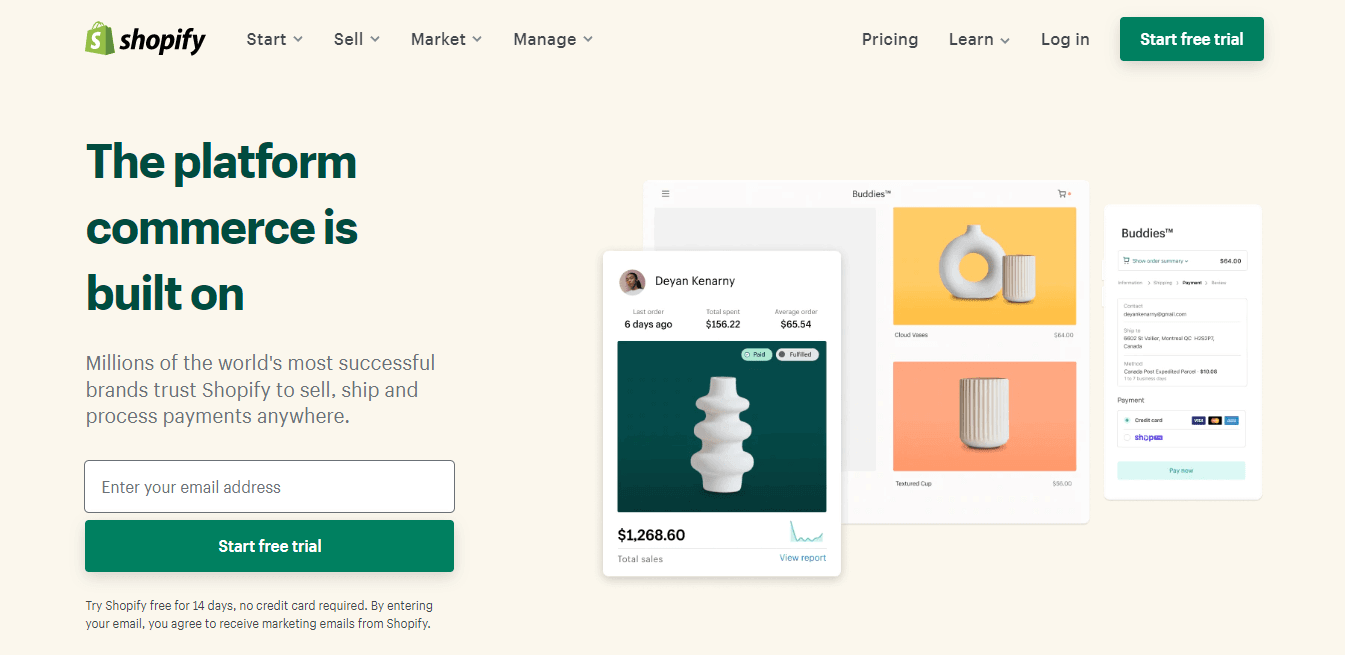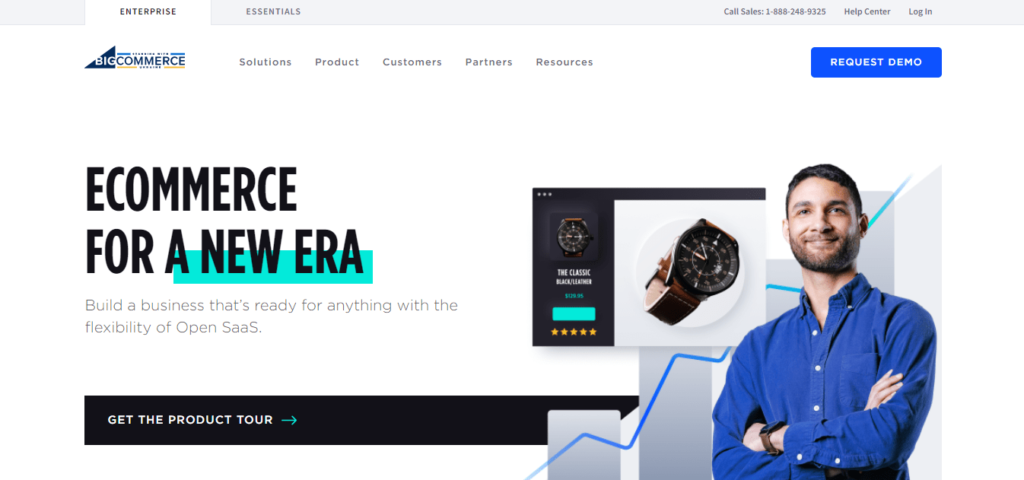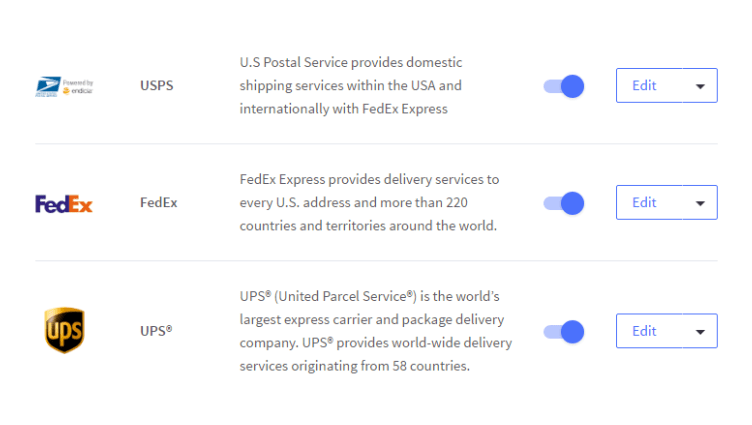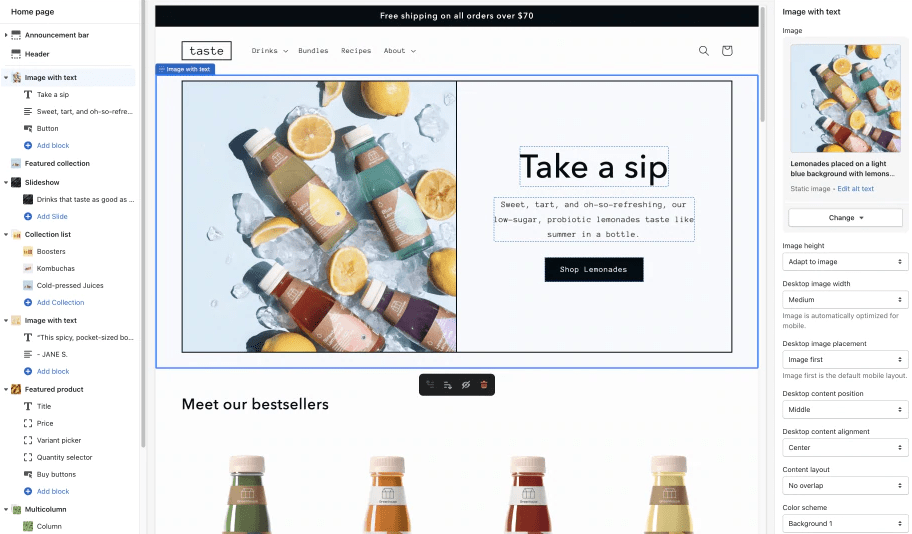BigCommerce Vs. Shopify Comparison – 2022

Both BigCommerce and Shopify are top choices if you’re looking for an ecommerce platform to power your online store. Each platform shines in its work rite, but we think Shopify is the better choice for most people. You get excellent support, a beautiful storefront, an easy-to-use website builder, and useful email marketing features at a reasonable price.
Regardless, BigCommerce is well adapted for multichannel sales and beats Shopify in this regard. Therefore, we’ve put together this head-to-head comparison to help you decide which platform is best suited for your use case.
BigCommerce Compared to Shopify
We think Shopify is the best ecommerce platform for most people. The platform has everything you need to create a store from scratch, promote your products, process payments, and everything in between. It’s straightforward to use, and you can set up your store in just a few minutes. Shopify even comes with dedicated 24/7 customer support if you run into problems.

Still, BigCommerce is a top contender for the best ecommerce platform. It’s a desirable option for multi-channel sales. The platform comes with numerous out-of-the-box features to set you up for success. For example, you can easily handle multiple sales channels, including online storefront, point of sale, Google Shopping, Amazon, eBay, and Walmart.

Shopify offers a 14-day free trial if you’d like to try it out before purchasing a plan. For its part, BigCommerce lets you try it out for free for 15 days before picking a plan.
More Top Ecommerce Platforms and Software
We put our team to task finding the best ecommerce platforms on the market. BigCommerce and Shopify made it on the list. However, there are other great alternatives worth exploring. We tested more than 20 different software and created an in-depth post where you can see all of our top picks.
Where BigCommerce Shines
BigCommerce has many noteworthy capabilities. Some of the platform’s strong suites include:
No Transaction Fees: BigCommerce is fairly priced to start with. However, unlike most ecommerce platforms, it doesn’t impose transaction fees on any of its plans. Instead, you’ll only be paying your payment gateway’s charges. BigCommerce also supports more than 55 payment providers so that you can choose your favorite one without penalties.
Shopify charges between 0.5% and 2%, depending on your plan. But you can avoid the transaction fees if you choose Shopify Payments. BigCommerce is ultimately cheaper if you prefer to use third-party payment processors.
Powerful Sales Features: BigCommerce offers some of the most extensive and powerful sales features. These features are built-in, so you won’t have to rely on third-party plugins that can be expensive, slow down your website, and introduce security risks. You get handy features like real-time third-party-carrier shipping quotes and ratings and reviews out-of-the-box.

Even BigCommerce’s basic features are more robust than most competitors. For instance, you can create over 600 variations of a product. You can even drag and drop elements on the store builder, something that Shopify doesn’t allow. Instead, you’d need to choose the desired element from a list, and Shopify will place where it wants the element to go.
Numerous Product Options: Again, you can create up to 600 variations of a product. Furthermore, you can offer up to 250 product options. Shopify limits your product options to three, including size, color, and material.

BigCommerce is a superior option if you have numerous product options and variations. You’d need a third-party app to extend your possibilities on Shopify.
Unlimited Staff Accounts: A staff account allows you to manage the store’s backend. BigCommerce lets you create unlimited staff accounts on all plans. However, Shopify limits this access to one account on the lite plan and 15 on the Advanced plan.
BigCommerce is an excellent choice if you have multiple people managing the business. You’ll be able to provide the required access without necessarily upgrading your plan.
Accelerated Mobile Pages (AMP) – A slow-loading store is a quick way to lose customer interest. Google developed the Accelerated Mobile Pages (AMP) program to increase page loading speed on mobile devices. BigCommerce supports this functionality right out of the box.

You simply need to enable the AMP capability on your BigCommerce themes, including the free ones. Shopify supports the same capability, but you’ll need to pay extra for a third-party app. Nevertheless, it’s a great feature for reducing site abandonment and improving your SEO score.
Where BigCommerce Falls Short
BigCommerce has its shortcomings. Below are a few areas where BigCommerce falls short:
Sales Limit: Shopify has a yearly sales limit for all its plans. For instance, the sale limit is $50K for the Standard plan. You’ll need to upgrade to the Plus plan to extend your limit to 180K. Shopify doesn’t have a sales limit on any plan.
Significant Learning Curve: On the whole, BigCommerce offers more scalable features and flexible customization options than Shopify. However, the platform has a steep learning curve for beginners, thanks to its powerful features. In addition, there is a fair bit of manual work required to set up the back-end.
Additionally, BigCommerce terminology may be challenging to master. There’s a handy tutorial to help you with this. But, simple tasks like adding a product may require referencing the platform’s terminology.
Where Shopify Shines
There is a lot we like about Shopify. Some of the best reasons to use this platform include:
Excellent Knowledge Center: Shopify is very intuitive and easy to use. Furthermore, it has an extensive knowledge base housed in its help and support knowledge center. The best part is that the knowledge base is woven directly into the platform’s dashboard.
For example, Shopify handy wizard provides helpful prompts for every step of the setup process. Now, say you want to set up and optimize checkout. The wizard prompts link directly to the relevant page in the Shopify Knowledge Center. Here, you’ll get step-by-step instructions for providing your customers with the best checkout experience when you click the link.

Superior Free Themes: Shopify offers at least 17 free themes, more than BigCommerce. Shopify’s themes are also very high quality compared to BigCommerce. You can also customize the themes to fit your brand, image, and marketing.

BigCommerce themes have very few variations. For instance, you may find two themes that look almost exactly the same except for having different color schemes. Unfortunately, this flaw limits the number of templates you can choose from.
Automated Catalogs: Shopify has a handy feature for managing large catalogs. The Automated Collections feature where you can define the conditions for automatically adding products to their respective categories. You can require a product to meet any conditions or all conditions to be added to a collection.

For example, your online shoe store carries sportswear from all major brands. You can set up Shopify to automatically populate your Nike Sportswear category with matching Nike products rather than adding them manually. BigCommerce bulk edit feature isn’t nearly as intelligent.
Shipping Discounts: Shopify lets you offer enticing shipping discounts to stay competitive. All plans come with Shopify Shipping which offers terrific discounts of up to 88% off shipping. In addition, the built-in tool lets you access numerous benefits from your dashboard.

For instance, you can track shipments, buy and print shipping labels, display calculated shipping rates at checkout, and enjoy discounted shipping rates. It’s an excellent feature if you’re only shipping Shopify products and use DHL Express, USPS & UPS, Sendle, and Canada Post.
Built-in Email Marketing: Shopify certainly recognizes the importance of email marketing in generating sales. Shopify Email is a built-in email marketing feature with all the crucial capabilities you need in this kind of tool. You don’t need to leave the platform to execute your email marketing strategy.

The feature comes with crucial automation such as welcome emails, customer winbacks, and first purchase upsells. It’s not as sophisticated as standalone email marketing software, but it’s a good start, especially for novices. Unfortunately, BigCommerce doesn’t have this capability built into the platform.
Supporting Apps: If you need to do anything on Shopify, there’s probably an app. The platform offers numerous apps on the Shopify App Store. For instance, you can use the Point of Sale (POS) app to manage in-store purchases, such as processing payments or generating email receipts.

Similarly, you can use the Shopify app to manage the essential elements of your online store, such as fulfilling orders, viewing reports, or adding products. There’s even a dedicated app for bringing your Shopify products to Instagram or Facebook and another for listing your products across Google services. In addition, there are dedicated apps for marketing, store design, sourcing and selling products, conversion, fulfillment, customer service, merchandising, etc.
Where Shopify Falls Short
There are areas that Shopify could improve. Some of the less impressive Shopify features include:
Transaction Fees: You can avoid the transaction fees if you choose Shopify Payments. Otherwise, you’ll be charged a fee every time you process a payment with a third-party payment gateway. Unfortunately, Shopify Payment is only available in 17 countries, limiting your customer base.
Limited Shopping Cart Functionality: Shopify offers discounted shipping if you use Shopify Shipping. You also get By One Get One (BOGO) coupon codes built in, but that’s it. You’ll need a third-party tool to provide cart-level discounts like automatic discounts, tiered pricing, and quantity breaks.
You’ll find this functionality built into BigCommerce Enterprise. It’s the most expensive plan, but it suits enterprises with large sales volumes. You can even offer discounts to specific customer groups, such as senior citizens or veterans.
Basic Reporting: Shopify only offers basic reporting with its cheapest plan. You only have access to the online store dashboard with basic statistics like orders, revenue, and customers. You’ll need to upgrade to a more expensive plan to unlock more reporting tools.
Alternatively, you could install Google Analytics in your Shopify store to extend your reporting capabilities if you’re unwilling to upgrade. By contrast, BigCommerce offers more robust reporting out-of-the-box with all its plans.
The Final Verdict on BigCommerce Compared to Shopify
Both BigCommerce and Shopify are exceptional ecommerce platforms. However, both platforms cost about the same, so it might not matter which one you choose from a price perspective.
Shopify offers three plans:
- Basic for $29 per month
- Shopify for $79 per month
- Advanced for $299 per month

BigCommerce offers four plans. These include:
- Standard for $29.95 per month
- Plus for $79.95 per month
- Pro for $299.95 per month
- Custom pricing for the enterprise plan

However, BigCommerce offers more features than Shopify. As a result, it provides more value for money. For instance, you only get two staff accounts with Shopify’s Basic plan. On the other hand, BigCommerce offers unlimited staff accounts with its cheapest plan.
Similarly, you get basic reporting with Shopify Basic but professional reporting with BigCommerce Standard. Still, keep in mind that you may not use all BigCommerce features, so pricing is not the best defining factor for which option is better.
If we had to choose a winner, it would be Shopify. It beats BigCommerce on several fronts. For example, Shopify is easier to set up and customize, offers better quality free and paid themes and templates, is easy to organize your store, is faster, and doesn’t have a sales limit.
Shopify is undoubtedly the ideal choice if you want to create and launch a professional store quickly. Furthermore, many BigCommerce add-on features are most useful for enterprise users and easy to overlook. Finally, Shopify is constantly innovating and gets better every year.
However, Shopify isn’t always the best choice. There are notable justifications for choosing BigCommerce over Shopify. For instance, BigCommerce is perfect for technical users. In addition, the platform is better for creating a stand-out store and offering customers a customized shopping experience.
BigCommerce also has one of the best analytics and reporting capabilities. This functionality is crucial for enterprises, and it is hard to beat BigCommerce. It’s also a terrific platform if you don’t want to rely on third-party plugins and extensions to scale your store.
BigCommerce also offers better SEO features and functionality. Again, this is a crucial feature for enterprises that want an edge over the competition. Finally, BigCommerce makes multi-channel selling a breeze, with everything you need built into the platform.
The final verdict?
Choose Shopify if you want to set up a professional online store quickly. The platform is unrivaled for its modern, high-quality templates and wide range of typefaces. Shopify is also very flexible and is just as good for a small store selling the occasional product or a large enterprise with a complex inventory.
Shopify is also ideal if you prefer to run your store on the go. You get access to many supporting apps for managing every aspect of your store from your mobile device.
Finally, Shopify is the ideal option for non-technical users. Setting up your backend is simple and doesn’t require any design experience. You also get robust backend functionality by default, which you can extend with numerous third-party apps.
Choose BigCommerce if you prefer not to rely heavily on third-party apps to extend your store’s functionality. BigCommerce comes with extensive default features, even with the cheapest plan. In addition, you get ratings and reviews, advanced reporting, multi-currency selling, cookie consent tools, and a page builder out-of-the-box with the most affordable plan.
BigCommerce is also ideal for experienced users that prioritize customization. You can create custom fields, upload files, and generally create a unique store and superior shopping experience. It’s easier to bring your dream to life on BigCommerce if you have solid design experience.
Finally, BigCommerce is perfect for multi-channel selling. It’s a terrific platform if you want to venture beyond your online store and start selling on Google and Social media. There are no transaction fees, giving you a head start when scaling your business.
There are more ecommerce platforms to choose from, just in case BigCommerce and Shopify don’t quite hit the mark. Our other top picks include:
- Shopify – Best ecommerce platform for most
- Wix – Best ecommerce platform for beginners
- Bluehost – Best for automatic WooCommerce store setup
- Squarespace – Best portfolio-based ecommerce builder
- BigCommerce – Best for multichannel sales
- Shift4Shop – Best ecommerce platform for developers
- Ecwid – Best free shopping cart extension
- WooCommerce – Best ecommerce plugin for WordPress
- Easy Digital Downloads – Best WordPress plugin for digital products
- Volusion – Best ecommerce platform for large stores
- Magento – Best enterprise ecommerce platform



